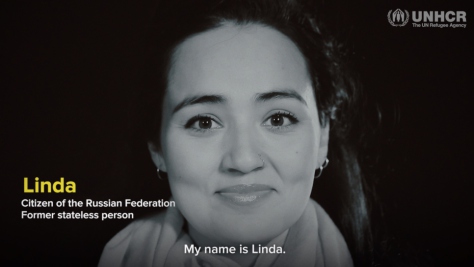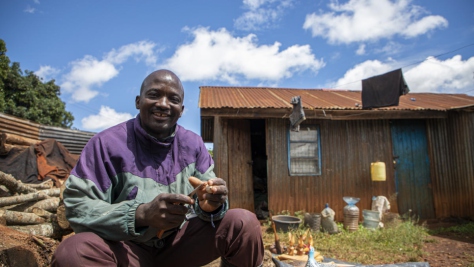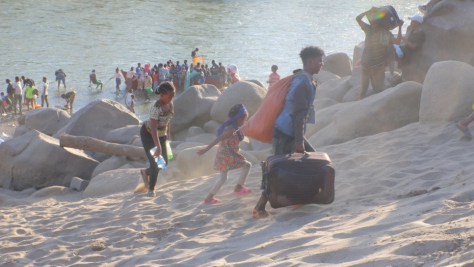UNHCR seeks $13 million to step up response to South-East Asia boat crisis
This is a summary of what was said by UNHCR spokesperson Melissa Fleming – to whom quoted text may be attributed – at today's press briefing at the Palais des Nations in Geneva.
UNHCR is seeking US$13 million to help with the needs of new boat arrivals in South-East Asia, where thousands of refugees and migrants have been crossing the Bay of Bengal and the Andaman Sea.
The appeal was launched yesterday, and is aimed at beefing up our work to do with protection for the nearly 4,800 people from Myanmar and Bangladesh who have been disembarked from smugglers' boats in the last month. In the latest incident, earlier this week, over 700 people were landed in Myanmar's Rakhine state. They included some 120 women and children who said they had been at sea for at least three months.
With the monsoon season imminent, it's estimated that thousands of people may still be at sea.
UNHCR's appeal follows from last Friday's regional meeting of affected States held in Bangkok. It also reflects elements of a 10-point plan of action proposed by UNHCR, the International Organization for Migration and the UN Office on Drugs and Crime.
The funds will allow UNHCR to step up its response in three main areas: Firstly by helping meet the international protection needs of new boat arrivals, secondly by enhancing information available to people considering the journey, and thirdly by targeting some of the root causes of these movements in source countries.
To date, UNHCR's teams have registered just over 1,000 Rohingya new arrivals in Indonesia. In southern Thailand we have distributed relief supplies and are counselling dozens of new arrivals, while in Malaysia we are scaling up to meet the needs of arrivals once consistent access is provided.
Additional resources are needed to set up mobile multi-functional teams to quickly identify and help people with specific protection needs. Refugees who cannot return home will need assurance that they can stay in host countries temporarily with access to legal work until conditions are conducive for voluntary return or until other solutions are found. Where possible, UNHCR will support livelihood programs within national structures to serve the needs of both refugees and host communities.
The appeal envisages trainings for the region's search-and-rescue officials on international legal principles and protection, and exploration of predictable disembarkation options. UNHCR will also expand its monitoring and reporting on maritime movements to include information campaigns providing factual information to potential travelers about the risks and mistreatment at the hands of smugglers and traffickers.
To reduce incentives for people to undertake these dangerous sea journeys, UNHCR will seek legal alternatives such as programs to transition from refugee to migrant status in host countries in need of temporary migrants.
A key part of the appeal focuses on mobilizing support for humanitarian, human rights and development needs in source countries to address the root causes of movement. UNHCR is ready to work with the governments to address issues of citizenship and documentation of people in Bangladesh and in Myanmar's Rakhine state.
To help resolve the three-year-long internal displacement in Rakhine state, UNHCR is seeking to expand assistance to and monitoring of displaced families who wish to return home or establish new homes.
For more information on this topic, please contact:
- In Bangkok, Vivian Tan on mobile +66 818 270 280
- In Geneva, Babar Baloch on mobile +41 79 557 9106
-

Aid urgently needed for Ethiopians streaming into Sudan
17 Nov 2020 Over 27,000 Ethiopians have fled ongoing fighting in the Tigray region for safety in Sudan. Food, shelter and medicine are among urgent requirements. -

Public Health and Nutrition in operationalizing the Global Compact on Refugees and comprehensive responses
17 Nov 2020 This guidance for UNHCR and partner staff explains how to operationalize the Global Compact on Refugees and comprehensive responses in the sectors of Public Health and Nutrition. Sectoral programming in a comprehensive response context means applying a whole-of-government (i.e. relevant national and local authorities for health and nutrition response) multi-stakeholder approach and planning with relevant partners. -

Stateless for seven decades: Sergio Chekaloff can finally say #IBelong in Spain
17 Nov 2020 -

'It was a very emotional moment … I felt that now I definitely exist' |#IBelong Ending Statelessness
17 Nov 2020 -

Still Unprotected: Humanitarian Funding for Child protection (2020)
17 Nov 2020 Children affected by humanitarian crises are most vulnerable to abuse, exploitation, violence, neglect and have a fundamental right to be protected. This report provides an in-depth analysis of 19 Humanitarian Response Plans and Refugee Response Plans from 2019. -

Thousands flee fighting in Ethiopia, cross border to Sudan
17 Nov 2020 -

Proud camels and peaceful doves: gifts with meaning
17 Nov 2020 UNHCR's online marketplace, MADE51, offers ornaments handmade by refugee artisans -

Pace of Ethiopian refugee arrivals in Sudan unseen in the last two decades
17 Nov 2020 -

IOM and UNHCR carry out joint visit to the Canary Islands amid increasing arrivals
16 Nov 2020
